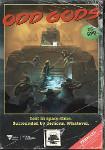
Odd Gods - Interview: Odd Gods’ Gil Maclean
Indie Graze interviewed Gil Maclean about Odd Gods.
...
EM: The combat system has drawn a fair amount of attention, in that characters are given orders but don’t complete those instructions until the gamers end the turn, meaning opponents and players act in a way that combines decision making and turn-based actions somewhat differently from classic isometrics (Arcanum, Fallout, etc). The results can be unexpected and crowd-pleasing, anticipating what an opponent might do, not what they have just done. A number of games currently in development are experimenting with combat (Disco Elysium uses a text/story system, while Copper Dreams has a delay effect), so when it comes to creating this aspect of the game, what do you hold as your criteria, and how do you see combat contributing to the larger project goals?GM: Ah. Holy shit, I’m fascinated by the stuff that Studio Zaum (Za/Um?) and Whalenought Studios are doing with those games. So bloody cool to see original RPGs with non-Tolkien fantasy settings on the market of that quality. People often refer to Odd Gods in the same sentence as those two games, which is a massive compliment. Hopefully, we can live up to that comparison.
Odd Gods’ combat system is ‘phase-based’, which means that your turn and the enemy’s turn play out simultaneously. This is technically hard to achieve, which is why you don’t see it that often, but when it works.. It’s pretty damn cool.
When designing our combat system, I was a bit tired of RTWP and traditional turn-based combat and wanted to roll my own system. I grew up playing wargames with my Dad, which used a kind of simultaneous turn system to simulate 18th century warfare. The thrill of not knowing what your opponent was going to do – but crucially, having some imperfect knowledge – that’s at the heart of it. Also – the market is saturated with derivative combat systems that a lot of (very excellent) studios have mastered – Obsidian and Larian spring to mind. I don’t want to compete with them, and it’s fun to make something new.
There’s some design pillars I used.
(I) The major game systems must be in symbiosis with the game theme.
The game’s theme is interstitial spaces and cognitive dissonance – design a combat system to match.
(II) Tactical determinism, not randomisation.
Movement should be just as tactical and effective as swinging a weapon. Melee and Ranged combat should be equally deep! No Auto Attacks – every decision counts.
(III) The system must support ‘tech imbalance’ without resorting to number crunching.
A Roman Legionary should have a chance to take out a Space Marine, but an assault rifle should take down a Knight.
(IV) No RNG.
If you’re next to an enemy, and you aim a shotgun, or a blunderbuss, or swing a skateboard at their head – you hit them. Every time. If I’ve gone to the trouble of flanking an enemy, and I have the requisite skills and weaponry, that’s a flank or a backstab.
(V) Don’t use ‘RPG cliches’.
No bullet sponges. No magic. No potion-chugging. No WOW-derived MMO style combat roles. No 3 bajillion HP.
(VI) Play a role, not a spreadsheet.
Your efficacy in combat is determined by your ability to read the battlefield, your character’s equipment, and your character’s strengths and weaknesses. Character development still matters, but it’s not the primary driver of success. A neophyte can outwit a master, if they’re careful, or if the master is arrogant or distracted, or overwhelmed.
[...]
Thanks daveyd!
Information about
Odd GodsSP/MP: Single-player
Setting: Modern
Genre: Tactical RPG
Platform: PC
Release: In development

